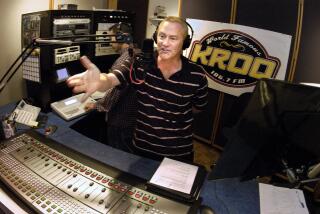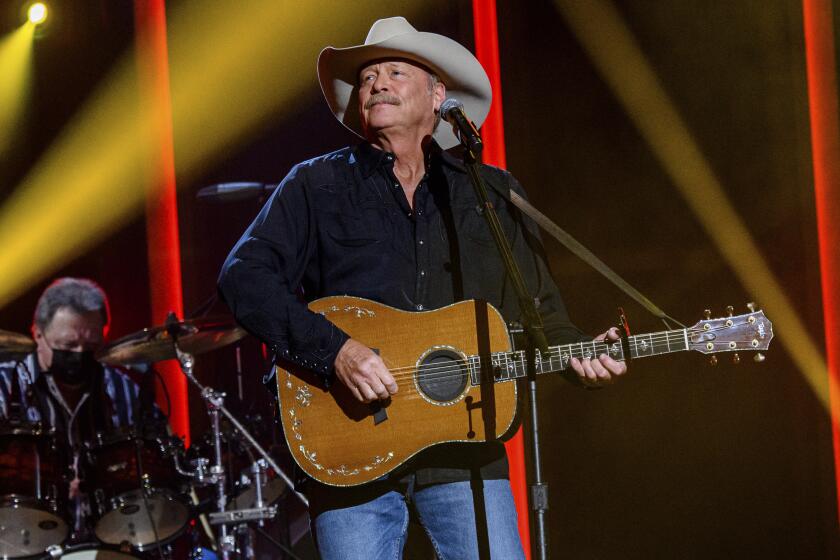ROCK RADIO: BACK TO THE FUTURE
- Share via
L.A. rock radio has gone oldies crazy.
Just spin the dial and listen for yourself. With the exception of a few popular Top 40 stations, local radio sounds like it’s being run by a bunch of program directors whose new toy is a time machine.
KBZT-FM (known as K-BEST) has become KLSX, playing “classic-rock” from the ‘60s and ‘70s. KMET-FM plays “Work Force Double Shots” of Janis Joplin tunes. KNX-FM reels in the years with Steely Dan. KLOS-FM opts for “Noontime Nuggets” featuring Pink Floyd and Led Zeppelin. KRTH-FM is playing Jim Croce and the Eagles. Even KROQ-FM is playing old cuts from the Clash.
The official moniker for all this old-wave music is “Classic Rock.” Others have dubbed it Rock Re-Runs or radio’s new Back-to-the-Future format. And it’s hardly limited to radio. The entire entertainment world seems to be recycling the past, whether it’s revivals on Broadway or sequels in Hollywood.
Whatever you call it, record industry observers say it’s one of the most unhealthy new trends they’ve seen in years.
“It’s not a good environment for new music, that’s for sure,” said Jeff Pollack, a leading radio consultant whose firm handles about 50 rock stations around the country, including pop oldies station KNX and hard-rock outlet KNAC-FM locally. “It’s all part of an incredible conservatism in radio. No one wants kids anymore. They all want the 25-to-34, or even the 25-to-44 listeners, the baby-boomers that advertisers are trying to attract. The problem is that in radio, everything is always overkill. So instead of having a little bit of this oldies business, we’re having a lot.”
Needless to say, record company promotion execs--whose jobs hinge on breaking new artists--are particularly unhappy with this oldies explosion. “It’s the worst that I’ve ever seen it in my seven years in the business,” said Michael Plen, vice president of promotion at I.R.S. Records. “Classic rock is like a fast-food format; it’s the Burger King of radio. It gives programmers a quick ratings fix, but it’s ultimately going to burn people out on all this old music.
“Somehow, in the midst of all this, we’ve managed to break a new band like Timbuk 3 on album-rock stations, but we’re looking at a lot of other ways to get exposure for new groups, either through tours, videos or publicity campaigns.”
Geffen Records promotion chief Al Coury calls the oldies craze “an act of desperation” by stations that prefer to play cobwebby guaranteed hits than take a chance on a new artist.
“It takes us four times as long to break a new act now than it did a year or two ago,” he explained. “You need to get a new record on a minimum of 25 or 30 stations to give it a solid test. In the past, it would’ve taken two to four weeks to do that. Now it takes seven or eight weeks, if you can even get that far. We’ve done very well with records by Peter Gabriel, Rick Ocasek and Wang Chung, but you have to aim for a much smaller piece of air time. Radio ads for new records are probably down at least 50%, or even more.”
What makes this trend even more disturbing is that with fewer openings on radio play lists for new groups, there’s less incentive than ever for record companies to sign new artists. “Since you can only break so many new acts, it’s going to make it a lot tougher for new artists to get signed, and even tougher to get their records released,” said Coury. “A lot of the superstars of today, like Phil Collins and Peter Gabriel, didn’t make it on their first record, or even their second or third. And you have to wonder, if they had come out today, with radio the way it is, whether they would have ever made it at all.”
More to Read
The biggest entertainment stories
Get our big stories about Hollywood, film, television, music, arts, culture and more right in your inbox as soon as they publish.
You may occasionally receive promotional content from the Los Angeles Times.










